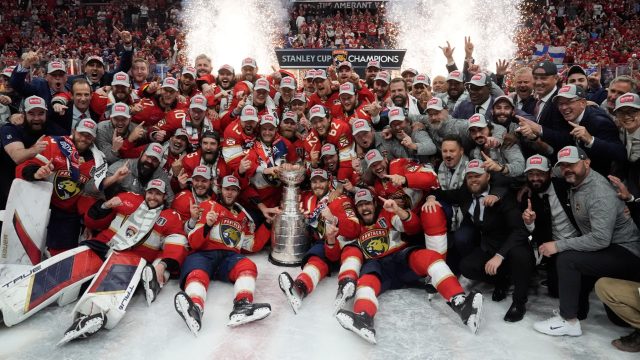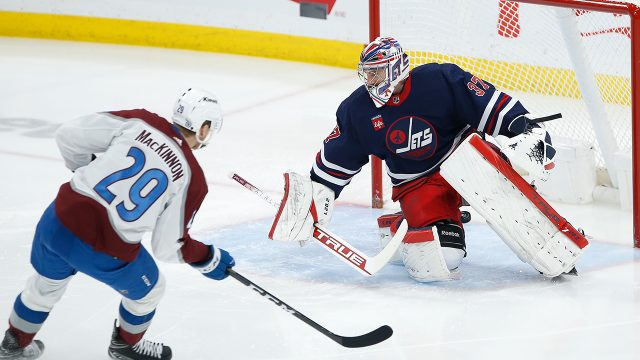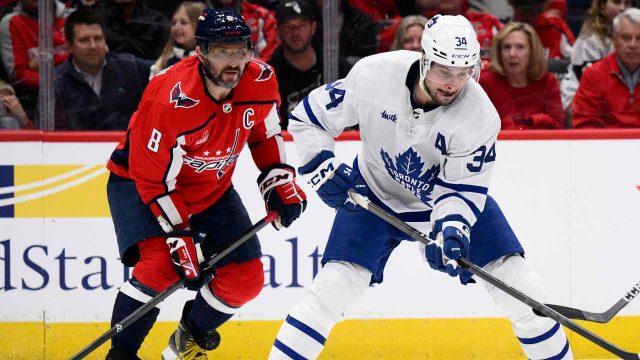
The Friday Four is a collection of thoughts and information on some intriguing player storylines from around the NHL. On deck this week is:
• Fleury is one of a kind
• Wolf deserves Calder if Flames get in
• Who should Carolina’s starter be in the playoffs?
• Bobrovsky already in post-season form
Marc-Andre Fleury, Minnesota Wild
Back in early October, most goalies were intensely preparing for the upcoming 2024-25 NHL season. The nature of the position requires laser focus, attention to detail and thorough scouting of the opposition’s shooters. Marc-Andre Fleury, on the other hand, was donning a wig, fake moustache and sunglasses, joining the Minnesota Wild ice crew before a pre-season game in his final NHL season, much to the delight of his teammates doubled over with laughter.
This has always been Fleury’s way. While the majority of goaltenders are rarely seen or heard from outside of the crease, you can’t miss Fleury. The perpetual prankster leads the league in smiles per 60, and perhaps no player has had more fun both on and off the ice. The Wild are likely headed to playoffs, but this weekend they have back-to-back games on Friday and Saturday, which could potentially be Fleury’s final start in a career we may never see from another goalie again.
-

-
Watch the Stanley Cup Playoffs on Sportsnet
The NHL’s best are ready to battle for the right to hoist the Stanley Cup. Watch every game of the Stanley Cup Playoffs on Sportsnet and Sportsnet beginning on April 19.
Fleury’s career bridged two different eras of goaltending. He was drafted a month after Patrick Roy retired and played against Ed Belfour, Dominik Hasek and Curtis Joseph. The 40-year-old has stayed relevant long enough to also guard the cage in meaningful games versus the likes of Connor Hellebuyck, Jake Oettinger and Andrei Vasilevskiy, watching the goaltending landscape change drastically in the process.
The Pittsburgh Penguins drafted Fleury in 2003 and if it was bold then to start a rebuild by taking a goalie first overall, it’s unheard of today. Don’t forget, before there was Sidney Crosby and Evgeni Malkin, the Pens hitched their wagon to Fleury to try to get the franchise going in the right direction. That’s something we may never see again, as since Fleury was drafted, only two goalies (Al Montoya and Carey Price) have been taken in the top 10. In the past 10 years, only five were even taken in the first round, with no netminders being a first-round selection since 2021.
Today, it’s extremely rare for a team to spend a high pick on a goalie, as organizations focus less on franchise goaltending and more on tandems. The number of netminders who can play 60 games in a season are few and far between, with the majority of teams preferring to alternate between goaltenders on a regular basis. Now, organizations also cultivate goalies slower than ever before, letting them get overripe in the minors before entrusting them with substantial NHL action.
This was not Fleury’s path, however. He logged 21 games as a 19-year-old rookie before the 2004-05 lockout hit. After play resumed, Fleury was the Penguins starter and played 50 games in 2005-06. From there, he would appear in at least 62 games in seven of the next nine seasons and never looked back.
As the way teams viewed the position changed, so did Fleury. His second and third Stanley Cups came as part of a tandem with Matt Murray, adapting to no longer being the starter and taking on a lesser role. When most goalies start to decline in their early 30s, Fleury had a second act that few can rival after arriving in Vegas. He helped take the Golden Knights to the Stanley Cup Final in their inaugural season and ended up winning his first Vezina Trophy in 2020-21 at age 36. In fact, the only goaltenders to have won the Vezina who were older than Fleury were Jacques Plante, Johnny Bower, Gump Worsley and Glenn Hall. That’s some elite company. In the 12 seasons since Fleury’s 30th birthday, he’s had a save percentage above .900 10 times.
Fleury is going to retire behind only Martin Brodeur in wins, games played and minutes played. It’s hard to imagine another goaltender playing at the level required to rival some of Fleury’s numbers based on the way the game is played today. Goalies often see their skills diminish and bodies break down as they get deeper into their 30s, and netminders playing until age 40 is very uncommon. Jonathan Quick and Sergei Bobrovsky are getting closer to 40, but both are well over 100 wins behind Fleury. Quick certainly won’t catch Fleury and Bobrovsky’s odds seem slim. Maybe goalies like Vasilevskiy and Hellebuyck, who are still further in the distance could come close, but that would require another half dozen years of high-level play. Easier said than done given their ages.
There’s a danger in Fleury’s fun-loving hijinks overshadowing his passion for the game, but it’s important not to forget what type of competitor he was. The guy who would tape a teammate’s equipment together for a laugh is also the same guy who wouldn’t hesitate to race down the ice and try to fight Jordan Binnington. The guy who would go to such lengths as putting a friend’s car on cinder blocks for a prank, is also the same guy who slashed Alex Ovechkin in pre-game warmups during the 2018 Stanley Cup Final. Being able to walk that line is hard to pull off.
That’s what makes him so special, and part of the nostalgia you get when a player like Fleury closes in on retirement is remembering all the incredible moments along the way. And the other part is realizing we won’t see another Marc-Andre Fleury. He was one of one.
This year’s Calder race has been one of the most exciting in years. There’s a case to be made for several rookies to claim the award, although most are leaning toward Lane Hutson at this point. Macklin Celebrini and Matvei Michkov deserve consideration as well, although they are running out of time to sway voters.
One player that may still have a sliver of hope for the Calder is Dustin Wolf, but that would require the Calgary Flames to miraculously sneak into the playoffs. That’s now going to be extremely challenging after a late blown lead to the Anaheim Ducks in a must-win game earlier this week. The rookie of the year is often one where whether or not a team makes the post-season doesn’t always come into play, though if the Flames were to qualify, Wolf would have a real case.
The 23-year-old has had a spectacular season under the circumstances, posting a .910 save percentage in his first real significant stretch of NHL action. He’s going to play in more than 50 games and has saved more than 13 goals above expected, but it’s been his play of late that’s really stood out. Prior to that debacle versus the Ducks, Wolf had a .933 save percentage in his previous four games, giving up just eight goals over that span. His efforts have kept the Flames in the playoff hunt probably a lot longer than they should have been.
There’s been a lot of pressure on Wolf because Calgary hasn’t provided him much offensive support. The Flames sit 31st in goals for this season, only Nashville is worse. Wolf has also faced as busy workload, with Calgary ranking in the bottom third of the league in shots against and in the bottom half of the league in high danger chances allowed. That’s a tough situation to navigate for a rookie goaltender.
The Flames have a massive game on Friday night against the Wild that they need to keep their post-season hopes alive. If Wolf delivers a big performance there and if Calgary can pull off the improbable and reach the playoffs, the Calder race may not be over just yet.
Frederik Andersen and Pyotr Kochetkov, Carolina Hurricanes
If the Carolina Hurricanes hope to go on a deep post-season and finally get over the hump, they are going to need more reliable goaltending.
It’s been a recurring theme for the group and often the one thing holding them back. Pyotr Kochetkov has played well for significant stretches, but inconsistency issues have crept up this season. He’s having his worst season as a pro, sporting a sub-.900 save percentage and the highest goals-against average of his career. More recently, Kochetkov has lost four of his past five starts and has a brutal .809 save percentage over that stretch.
Andersen, however, has been stellar this season, as he typically has been during his tenure with the Canes. The 35-year-old has won seven of his past nine outings and has had quality starts in all but two of those games. Not to mention he’s also saved almost twice as many goals above expected as Kochetkov. Andersen’s issue has never been his play, but more the injuries that have plagued him since joining Carolina. He’s only played 36 games combined over the past two seasons and trusting his body to hold up over a long playoff run is a risky bet.
There is also an added pressure on Carolina’s goaltending this season. The normally stingy Canes haven’t been as stout defensively as in past years in some ways. They remain excellent at limiting shots, currently tops in the league by allowing under 25 per game, but more of those are coming from quality areas. In 2023-24, the Canes only allowed 626 high-danger chances all season, but this season, they’ve already conceded 669 with still a few games to go. There was a time where Carolina was so structured and disciplined that they could even win a game with a Zamboni driver in net, but good goaltending is taking on more of an importance for this year’s version of the Canes.
Kochetkov is 10 years younger than Andersen and is locked up for two more years beyond this one, so Carolina would certainly like him to take the reins over an aging UFA. That said, Andersen has simply outplayed Kochetkov and should probably be their Game 1 playoff starter with the hope he can escape injury. If required, Kochetkov could always come out of the bullpen should Andersen falter.
There will likely be added scrutiny this year if Carolina has an early playoff exit. They gambled by trading away Martin Necas for Mikko Rantanen, but ultimately had to flip him to Dallas 13 games later after failing to agree on a contract extension. When the dust settled, they ended up with Taylor Hall, Logan Stankoven and a couple of first-round picks. That’s set them on a good trajectory for the future, but for a team that’s in win-now mode, it’s hard to say the Hurricanes are a better team today than they were at the beginning of the year. The best way to silence the critics is a deep playoff run.
Sergei Bobrovsky, Florida Panthers
The Florida Panthers have dealt with a myriad of injuries to key players down the stretch, but there seems to be little concern around the team. That’s likely because Sergei Bobrovsky has quietly worked his way into top form over the last month or so, giving opposing offences next to nothing on most nights.
Bobrovsky has not allowed more than three goals in a game since Feb. 4, a span of 17 games that also includes three shutouts. He also gave up three or fewer in 19 of 24 post-season games last season during Florida’s march to the Cup. This recent stretch of play is all the more impressive considering how banged up Florida is, especially on the blue line. Aaron Ekblad has been suspended since March 8 and Dmitry Kulikov was lost a week later to injury. Not ideally or by choice, it’s ultimately forced Uvis Balinskis and Jaycob Megna into larger roles.
Of course, a lot of Bobrovsky’s success is aided by the Panthers’ style of play, as their relentless forecheck grinds you down and makes it very difficult to get out of your own zone, let alone spend any significant time in your opponent’s. The way Florida was able to lock down the Toronto Maple Leafs on Wednesday, even without Matthew Tkachuk and Sam Bennett in the lineup, was very impressive.
The combination of Bobrovsky and Florida’s tactics makes even a small lead seem insurmountable. A one-goal lead feels like three. That’s why I think the Panthers are going to be the toughest out in the Stanley Cup Playoffs. Florida’s style of play lends it to a next-man-up mentality, and when they get healthy, they are only going to be more difficult to play against.






